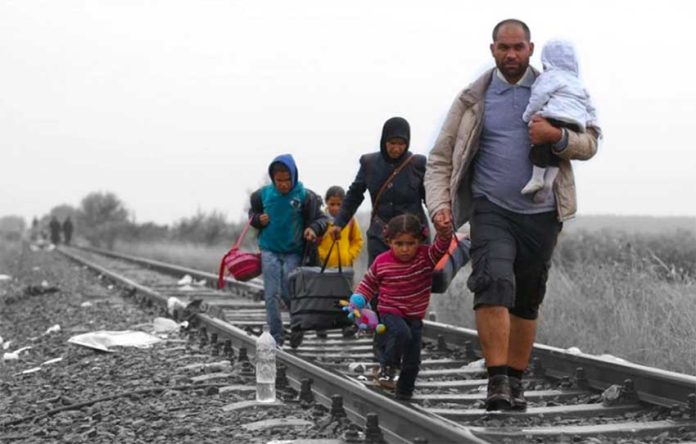The federal government has rejected the United States’ announcement that it will return asylum-seeking migrants to Mexico to await their immigration court hearings via a second border crossing.
The United States plan, formally called the Migrant Protection Protocols but initially dubbed “Remain in Mexico,” began earlier this year at the San Ysidro border crossing between Tijuana and San Diego, and will now extend to the crossing between Mexicali and Calexico, U.S. Department of Homeland Security (DHS) officials said Monday.
The Secretariat of Foreign Affairs (SRE) said yesterday that “the Mexican government doesn’t agree with this unilateral measure implemented by the United States authorities.”
When the United States first announced in December that it would begin returning non-Mexican migrants to Mexico while their asylum claims were processed, the SRE said it would authorize for humanitarian reasons, and only temporarily, the entry of migrants from the United States.
It added that the returning migrants must have already been interviewed by U.S. authorities and given an appointment to appear before an immigration judge.
However, Foreign Affairs spokesman Roberto Velasco said at the time that there was no formal agreement between Mexico and the United States but rather that the “Remain in Mexico” plan was a “unilateral move” by the latter “that we have to respond to.”
Despite promising to only accept adult male asylum seekers, Mexico has also taken in returning women and children, The New York Times reported earlier this month.
Immigrant rights advocates have initiated legal action against the initiative, arguing that it forces migrants to wait in dangerous Mexican border cities where they are exposed to the same dangers they sought to escape from in their countries of origin.
United States immigration officials say that only 240 migrants have so far been returned to Mexico under the program, a small fraction of the 76,000 that crossed Mexico’s northern border last month.
“We are starting small to see how this process works,” a DHS official told reporters at a briefing. “Just to make sure that we have the coordination down with Mexico, and we have a process that works.”
The number now appears likely to increase, however. The SRE said migrants will begin arriving in Mexicali, Baja California, from Calexico, California, this week, while a report earlier this month said that the “Remain in Mexico” program could also be extended to the border crossing between Ciudad Juárez, Chihuahua, and El Paso, Texas.
The SRE added that Mexico has maintained contact with United States authorities to receive information about the people who will be returned to Mexico but only for “humanitarian reasons.”
“For the Mexican government, the primary purpose of contact . . . is to protect the human rights of affected migrants. This exchange of information does not in any way mean that the Mexican government agrees with the decisions and actions taken unilaterally by the government of the United States.”
Thousands of migrants, mainly from the northern triangle Central American countries of Honduras, Guatemala and El Salvador, have arrived at Mexico’s northern border in recent months as part of several large caravans.
President López Obrador, meanwhile, continues to publicly advocate for the implementation of a joint Mexico-United States development plan to address the causes of migration at their primary source – Central American countries.
Delivering a report Monday to outline his government’s achievements during its first 100 days in office, López Obrador said that he is not in favor of using force to contain migration.
More than 10,000 migrants were granted humanitarian visas in southern Mexico earlier this year that allow them to work in Mexico and access services for up to a year or alternatively travel to the United States’ southern border to seek asylum.
However, The New York Times said on March 1 that “Mexican officials are carrying out the Trump administration’s immigration agenda across wide stretches of the border, undercutting the Mexican government’s promises to defend migrants and support their search for a better life.”
The newspaper added that “Mexican authorities are blocking groups of migrants at border towns, refusing to allow them on to international bridges to apply for asylum in the United States, intercepting unaccompanied minors before they can reach American soil, and helping to manage lists of asylum seekers on behalf of the American authorities to limit the number of people crossing the border.”
The government’s decision to publicly reject the extension of the United States’ “Remain in Mexico” program but to accept the migrants for humanitarian reasons anyway appears to represent an escalation of what some officials have called a strategic decision by López Obrador not to anger Trump, with whom the president to date has maintained a diplomatic relationship.
Source: AFP (sp), NPR (en), The New York Times (en)
